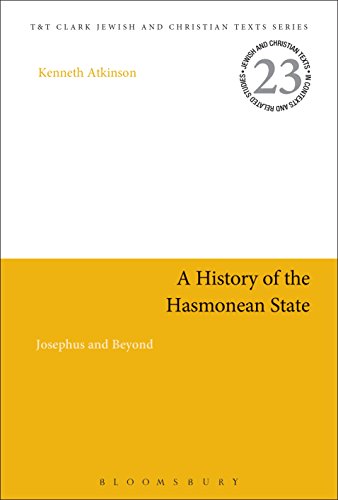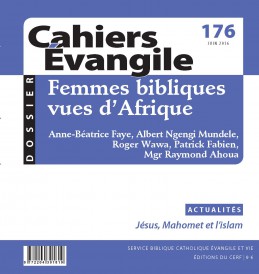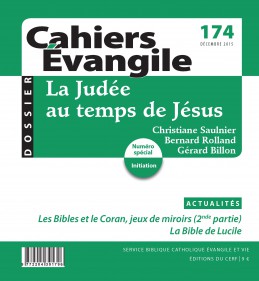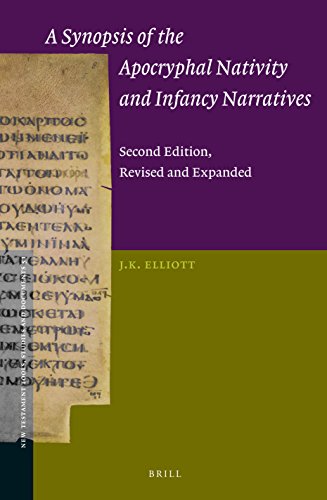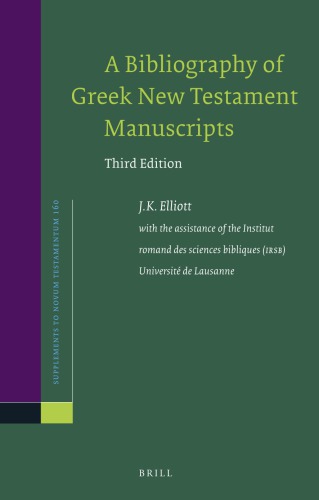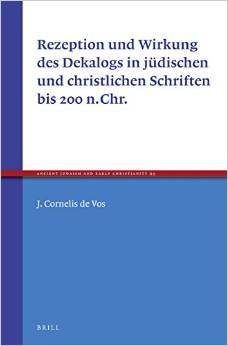Todo mundo que lida com estudos bíblicos conhece a coleção Cadernos Bíblicos, que foi parcialmente publicada pela Paulus. Pois é. Cadernos Bíblicos é a tradução dos Cahiers Évangile, em francês. Os Cahiers Évangile são publicados por Éditions du Cerf, Paris. São 4 números por ano. A versão espanhola sai pelo Editorial Verbo Divino – Estella (Navarra). Em português [de Portugal]: Difusora Bíblica – Fátima, Portugal. Leia o post anterior para ver a história da coleção.
Aqui, transcrevo a lista cronológica dos Cahiers Évangile. São 206 números até dezembro de 2023. A publicação pela Paulus foi descontinuada.
1972
1/2 Saint Marc, par J. Delorme
1973
3 Christ est ressuscité, par E. Charpentier
5 Saint Luc, par A. Georges
1974
8 Miracles de l’Évangile, Collectif
9 Saint Matthieu, Collectif
1975
11 Une lecture de l’Apocalypse, Collectif
12 L’accomplissement des Écritures, par P.-M. Beaude
13 Pour prier les Psaumes, par M. Mannati
14 Intertestament, par A. Paul
1976
17 Saint Jean, par A. Jaubert
18 Récits de l’Enfance (Mt 1-2 ; Lc 1-2), par Ch. Perrot
1977
19 Le message de l’épître aux Hébreux, par A. Vanhoye
20 Le deuxième Isaïe, par C. Wiéner
21 Les Actes des Apôtres, Collectif
22 Les Épîtres aux Corinthiens, par M. Quesnel
1978
23 Isaïe (1-39), par J.-M. Asurmendi
24 Les Béatitudes, par J. Dupont
25 Les Psaumes et Jésus, par M. Gourgues
26 Saint Paul en son temps, par E. Cothenet
1979
27 La Palestine au temps de Jésus, par Bernard Rolland, Christiane Saulnier
28 Aux racines de la Sagesse, Collectif
29 Mort et vie dans la Bible, par A. Marchadour
30 Jésus devant sa Passion et sa mort, par M. Gourgues
1980
31 Jésus-Christ dans l’évangile de Jean, par J. Guillet
32 La Sagesse et Jésus-Christ, par J.-N. Aletti
33 Épîtres aux Philippiens et à Philémon, par S. Légasse
34 L’épître aux Galates, par E. Cothenet
1981
36 Jonas, par V. Mora
37 L’eucharistie dans la Bible, Collectif
38 Ézéchiel, par J.-M. Asurmendi
1982
39 La première lettre aux Thessaloniciens, par M. Trimaille
40 Le livre de Jérémie, par J. Briend
41 L’Au-delà dans le Nouveau Testament, par M. Gourgues
42 La crise maccabéenne, par C. Saulnier
1983
43 Prophètes de l’Ancien Testament, par L. Monloubou
44 Les livres de Samuel et des Rois, par P. Gibert
45 Les Évangiles, origine, date, historicité, par P. Grelot
46 Cœur, Langue, Mains dans la Bible, P. Mourlon-Beernaert
1984
47 Les épîtres de Pierre, par E. Cothenet
48 Un chrétien lit le Coran, par J. Jomier
49 L’inspiration et le canon des Écritures, par A. Paul
50 Jésus, 13 textes du Nouveau Testament, Collectif
1985
51 La Deuxième épître aux Corinthiens, par M. Carrez
52 L’Esprit Saint dans la Bible, Collectif
53 Job, par J. Lévêque
54 L’Exode, par C. Wièner
1986
55 Le judaïsme de l’Exil au temps de Jésus, par C. Tassin
57 De Jésus aux sacrements, par J. Guillet
58 Matthieu le théologien, par J. Zumstein
1987
59 Sémiotique, par J.-C. Giroud et L. Panier
60 Mission et Communauté (Ac 1-12),par M. Gourgues
61 La lettre de Jacques, Collectif
62 Les épîtres de Jean, par M. Morgen
1988
63 Le Deutéronome, par F. Garcia Lopez
64 Amos et Osée, par J.-M. Asurmendi
65 L’épître aux Romains, par Ch. Perrot
66 La première épître aux Corinthiens, par M. Carrez
1989
67 L’Évangile aux païens (Ac 13-28), par M. Gourgues
68 Dieu notre Père, par J. Pouilly
70 Le sacerdoce dans la Bible, par J. Auneau
1990
71 Petit dictionnaire des Psaumes, par J.-P. Prévost
72 Les épîtres Pastorales, par E. Cothenet
73 Évangile et Tradition d’Israël, par M. Collin et P. Lenhardt
74 Parole de Dieu et exégèse, Collectif
1991
75 Parabole, par D. Marguerat
76 La violence dans la Bible, par P. Beauchamp et D. Vasse
77 Marie des évangiles, par J.-P. Michaud
78 Le livre des Nombres, par P. Buis
1992
79 Le livre de Daniel, par P. Grelot
80 Prier les Hymnes du Nouveau Testament, par M. Gourgues
81 Le Décalogue, par F. Garcia-Lopez
82 Les épîtres aux Colossiens et Éphésiens, par E. Cothenet
1993
83 Bible et royauté dans l’Ancien Testament, Collectif
84 Évangile et règne de Dieu, Collectif
85 Le Cantique des Cantiques, par A.-M. Pelletier
86 Le livre des Rois, par P. Buis
1994
87 Le livre des Chroniques, par Ph. Abadie
88 Le vocabulaire des Épîtres de St Paul, Collectif
89 Samuel, par A. Wénin
90 Les derniers Prophètes, par S. Amsler
1995
91 Qohéleth. Le Siracide, par D. Doré
92 Les Psaumes, par M. Collin
93 Des récits d’Évangile, par P. Moitel
94 Le Sermon sur la Montagne, par M. Dumais
1996
95 Esdras et Néhémie, par Ph. Abadie
96 Qu’est-ce que l’Évangile ? par P.-M. Beaude
97 Les traditions du Pentateuque, par N. Lohfink
98 De longs récits d’Évangile, par P. Moitel
1997
99 Les origines d’Israël, par D. Noël
100 Les premières lectures du Dimanche, Collectif
101 Le livre de Tobit, par D. Doré
102 Les manuscrits de la Bible, par R. Dupont-Roc et P. Mercier
1998
103 Lire les Évangiles Synoptiques, par J.-F. Baudoz
104 Le livre de Ruth, par A. Wénin
105 La justice dans l’Ancien Testament, par G. Verkindère
1999
107 L’analyse narrative, par A. Wénin, J.-L. Ska, J.-P. Sonnet
108 Le Nouveau Testament est-il anti-juif ? Collectif
109 Au temps des rois, par D. Noël
110 Les Apocalypses du Nouveau Testament, par E. Cuvillier
2000
111 Les sacrifices de l’Ancien Testament, par A. Marx
112 Les récits de la Passion, par S. Légasse
113 Le livre de la Sagesse, par D. Doré
114 L’œuvre de Luc, par O. Flichy
2001
115 La justice dans le Nouveau Testament, par P. Debergé
116 Le Lévitique – La loi de Sainteté, par P. Buis
117 Saint Marc, nouvelles lectures, par G. Bonneau
118 Le sacrifice du Christ et des chrétiens, Collectif
2002
119 Jésus de Nazareth, prophète et sage, par J.-P. Lémonon
120 Paroles de Vie, Collectif
121 Au temps des Empires (587-175), par Damien Noël
122 La géographie de la Bible, par Olivier Artus
2003
123 Cinquante mots de la Bible, par 5 animateurs bibliques
124 Mille livres sur la Bible, Collectif
125 Le livre des Juges, par Philippe Abadie
126 Paul, le pasteur, par Pierre Debergé
2004
127 Autour des récits bibliques, par Bernadette Escaffre, Daniel Marguerat, André Wénin
128 Relectures des Actes des Apôtres, par Odile Flichy, Michel Berder, Yves-Marie Blanchard, Philippe Léonard, Claude Tassin
129 Evangile de Jésus Christ selon saint Matthieu, par Claude Tassin
130 L’histoire de Joseph (Gn 37-50), par André Wénin
2005
131 Archéologie, Bible, Histoire, par Jacques Briend, Olivier Artus, Damien Noël
132 Le livre de Judith, la guerre et la foi, par Daniel Doré
133 Evangile de Jésus Christ selon saint Marc, par Philippe Léonard
134 Le livre de Josué, critique historique, par Philippe Abadie
2006
135 Les judéo-chrétiens : des témoins oubliés, par Jean-Pierre Lémonon
136 Des Maccabées à Hérode le Grand, par C. Tassin
137 Évangile de Jésus Christ selon saint Luc, par Y. Saoût (11 €)
138 Les écrits johanniques, par Y.-M. Blanchard
2007
139 Lectures figuratives de la Bible, par Cécile Turiot
140 “Ecoute, Israël”, commentaires du Deutéronome, par Norbert Lohfink
141 Lire la Bible aujourd’hui. Quels enjeux pour les Eglises ? (11 €)
142 Le livre d’Isaïe, par Dominique Janthial
2008
143 L’Alliance au coeur de la Torah, par Bernard Renaud
144 Des fils d’Hérode à la 2e Guere juive, par Claude Tassin
145 Evangile de J.-C. selon saint Jean, 1, par Bernadette Escaffre
146 Evangile de J.-C. selon saint Jean, 2, par Bernadette Escaffre
2009
147 Saint Paul, une théologie de l’Eglise ?, par Roselyne Dupont-Roc
148 Les écrits apocryphes chrétiens, par Jean-Marc Prieur
149 Un Dieu jaloux, entre colère et amour, par Bernard Renaud
150 Images bibliques : le Christ dans l’A.T., par Philippe Gruson
2010
151 “Tenez bon ! ” Relire la lettre aux Hébreux, par Jean-Marie Carrière
152 De l’Ancien Testament au Nouveau 1. Autour du Pentateuque, par André Paul
153 De l’Ancien Testament au Nouveau 2. Autour des Prophètes et autres Écrits, par André Paul
154 Le Dieu unique et les autres. Esquisse de l’évolution religieuse de l’ancien Israël, par Dany Nocquet
2011
155 “Nos Pères nous ont raconté”. Introduction à l’analyse narrative des récits de l’Ancien Testament, par Jean-Louis Ska
156 Le Pentateuque. Histoire et théologie, par Olivier Artus
157 Traduire la Bible en français, par Jacques Nieuviarts et Gérard Billon
158 Le couple dans l’Ancien Testament, par Bertrand Pinçon
2012
159 Diakonia. Le service dans la Bible (collectif)
160 Les anonymes de l’Évangile. Rencontres de Jésus dans les évangiles synoptiques, par Vianney Bouyer
161 Genèse 1-11. Les pas de l’humanité sur la terre, par Jean L’Hour
162 La terre dans la Bible, par Alain Marchadour
2013
163 La Parole du Seigneur. Sur l’exhortation Verbum Domini (collectif)
164 La Lectio divina, par Christophe de Dreuille
165 Pierre, le premier des apôtres (Collectif)
166 Le mystère de la Croix (Collectif)
2014
167 “Au miroir de la Parole”. Lecture de l’épître de Jacques, par Jacqueline Assaël et Elian Cuvillier
168 Samson, récit et histoire – Lectures de Juges 13-16, par Didier Luciani et Damien Noël
169 Mots de passe pour les Évangiles, par Marc Sevin
170 Le livre de l’Apocalypse, par Yves-Marie Blanchard
2015
171 Jacob, l’autre ancêtre, par Corinne Lanoir
172 L’Alliance chez les prophètes par Elena Di Pede
173 Pour lire l’évangile selon saint Luc, par Pierre Debergé
174 La Judée au temps de Jésus, par Christiane Saulnier, Bernard Rolland et Gérard Billon
2016
175 Interpréter les Écritures. Actes du colloque pastoral “Dei Verbum”, par Mgr Pierre-Marie Carré, P. Christophe de Dreuille, Mme Valérie Duval-Poujol, Mme Élisabeth Parmentier, Fr. Jean-Michel Poffet, Mgr Michel Santier, P. Christoph Theobald
176 Femmes bibliques vues d’Afrique, par Patrick Fabien, Anne-Béatrice Faye, Albert Ngengi Mundele, Roger Wawa, Raymond Ahoua
177 La Loi dans l’évangile de Matthieu, par d’ Odile Flichy
178 La miséricorde dans la Bible
2017
179 – Abraham (Genèse 11,27 – 25,10). Un guide de lecture
180 – Les quatre livres d’ Esdras
181 – Marc: cinq clés de lecture
182 – L’accomplissement des Écritures
2018
183 – Les animaux dans la Bible
184 – La première épître de Pierre
185 – L’évangile de Luc et les Écritures d’Israël
186 – Le Psaume 18 et la célébration de Noël
2019
187 – Temps de Dieu, temps des hommes
188 – Lettres aux Philippiens et à Philémon: clés de lecture
189 – Les enjeux de l’exégèse contemporaine
190 – Esther, le courage et la ruse
2020
191 – L’approche canonique de l’Écriture
192 – Repères pour une exploration historico-critique du Nouve
193 – Le lectionnaire des funérailles commenté au fil des text
194 – La résurrection des morts
2021
195 – Le Discours de Jésus sur la montagne
196 – Le secret messianique dans l’évangile de Marc. Quel rôle
197 – Le livre des Psaumes
198 – Le livre de proverbes et sa réception dans les traditions juives et chrétiennes
2022
199 – Le livre de Jérémie: signifier la parole
200 – Jérusalem dans la Bible
201 – Déjouer les logiques abusives
202 – Se convertir à l’Esprit
2023
203 – Lire les douze petits prophètes comme un livre
204 – Moïse, un géant discret
205 – Lire la Bible pour vivre le synode
206 – Les femmes de l’évangile de Matthieu
